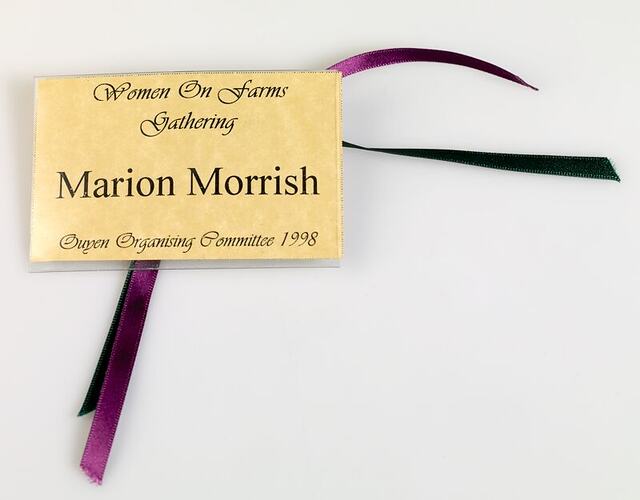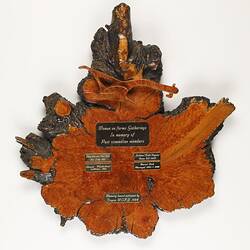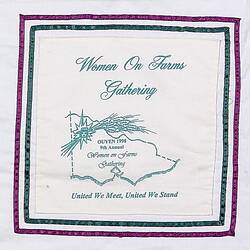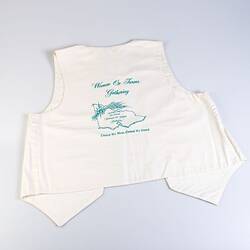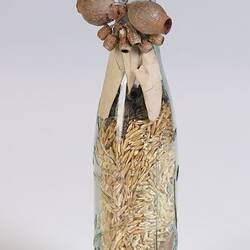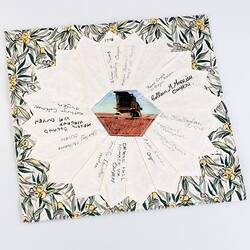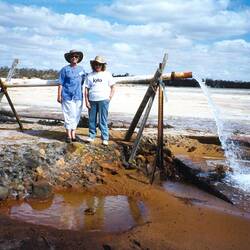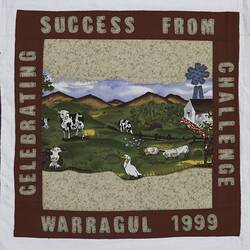Summary
Name tag worn by committee member Marion Morrish at the 1998 Ouyen Gathering. During the Gathering Marion delivered a speech about the hardships that she had faced during her life on the farm. Despite the mouse plagues, droughts and loneliness, she spoke about how 'the community spirit remains as strong as ever.'
The name tag features ribbons that refer to the feminist colours of white, green and purple. Name tags were used to identify and to acknowledge those who had worked to create the Gatherings.
Part of Museums Victoria's Invisible Farmer Project Collection. The Invisible Farmer Project was the largest ever study of Australian women on the land, uncovering the histories and stories of Australian women in agriculture. It began as a pilot project (2015-2016) and evolved into a three year (2017-2020) nation-wide partnership between rural communities, academic, government and cultural organisations, funded by the Australian Research Council.the absence of rural women in mainstream histories and museums.
Physical Description
Name tag in plastic cover. Black print on buff coloured card. Attached are two strands of ribbon, dark green and purple. Pin and clip at rear.
Significance
This object was collected by a member of the organising committee for the 1998 Ouyen Gathering. It represents and celebrates the voluntary work of those women who worked on the committee to bring about the Gathering. A key feature that unites all Victorian Women on Farms Gatherings is the voluntary nature of these events. Women from the local region usually come together approximately one to two years prior to the Gathering to begin planning and organising, which includes securing a venue, sponsorship, accommodation, catering, publicity, tours, workshops and speakers. During the event the organising committee continue to oversee and run the Gathering, and it is customary for them to wear name tags that will make them identifiable to Gathering participants. Objects such as this name tag represent the voluntary contribution that these women have made not only to the Gatherings themselves, but also to their local communities and to the wider rural women's movement in Australia.
The colours on the name tag are symbolic of the feminist movement. As part of the wider rural women's movement in Australia, the Victorian Women on Farms Gatherings have indeed championed and advocated for an increased recognition of the role of women in rural communities. At the Gatherings women have developed their networking skills through workshops, speeches and tours, and they have been encouraged to challenge the various gender inequalities existent in rural life; for example, patrilineal farm inheritance, over-representation of men on farming organisations and boards, and the stereotyped rendering of rural Australia as a male domain. Despite the political nature of the Gatherings, however, it must be noted that not all Gathering participants identify with feminism. To the contrary, some women have been adamant that they are not feminists, reflecting the diversity of the Gatherings along with the multiple ways within which women have identified, or not identified, with the term 'feminism' itself.
More Information
-
Collection Names
-
Collecting Areas
-
Acquisition Information
Donation from Marian Morrish - Ouyen Women on Farms Gathering, 30 Mar 2003
-
Creator
-
Place & Date of Event
-
Inscriptions
Text: Women on Farms /Gathering /Marion Morrish /Ouyen Organising Committee 1998.
-
Classification
Agriculture & rural life, Community activity - women on farms gathering, Identification
-
Category
-
Discipline
-
Type of item
-
Keywords
Agriculture, Gender Issues, Globalisation, Politics, Rural Life, Work, Rural Victoria, Women on Farms Gatherings, Women's Associations, Feminism, Agricultural & Farming Organisations
